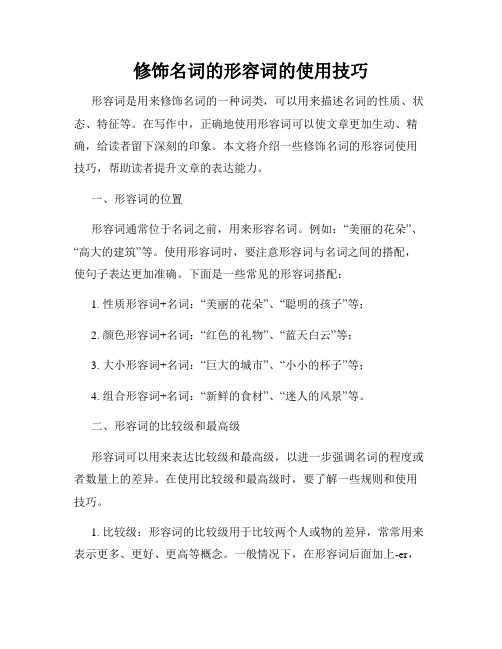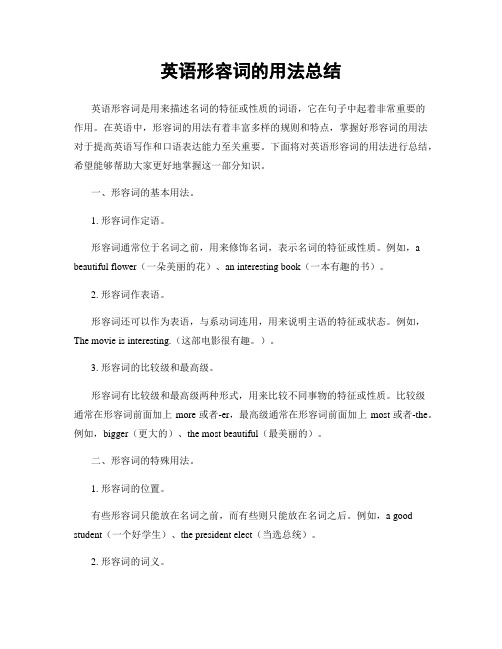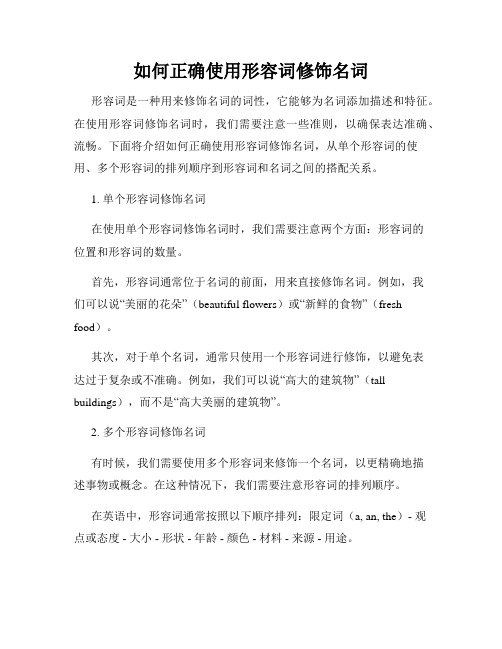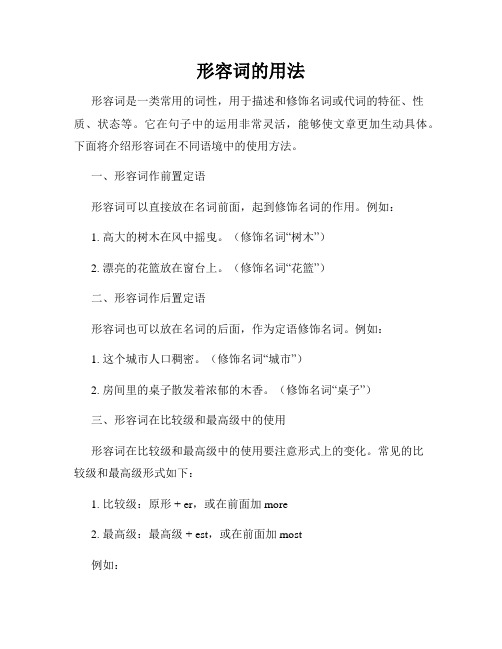形容词在名词前的运用
修饰名词的形容词的使用技巧

修饰名词的形容词的使用技巧形容词是用来修饰名词的一种词类,可以用来描述名词的性质、状态、特征等。
在写作中,正确地使用形容词可以使文章更加生动、精确,给读者留下深刻的印象。
本文将介绍一些修饰名词的形容词使用技巧,帮助读者提升文章的表达能力。
一、形容词的位置形容词通常位于名词之前,用来形容名词。
例如:“美丽的花朵”、“高大的建筑”等。
使用形容词时,要注意形容词与名词之间的搭配,使句子表达更加准确。
下面是一些常见的形容词搭配:1. 性质形容词+名词:“美丽的花朵”、“聪明的孩子”等;2. 颜色形容词+名词:“红色的礼物”、“蓝天白云”等;3. 大小形容词+名词:“巨大的城市”、“小小的杯子”等;4. 组合形容词+名词:“新鲜的食材”、“迷人的风景”等。
二、形容词的比较级和最高级形容词可以用来表达比较级和最高级,以进一步强调名词的程度或者数量上的差异。
在使用比较级和最高级时,要了解一些规则和使用技巧。
1. 比较级:形容词的比较级用于比较两个人或物的差异,常常用来表示更多、更好、更高等概念。
一般情况下,在形容词后面加上-er,或者在前面加上more来形成比较级。
例如:“大-->更大”、“smart--> smarter”等。
然而,有些形容词有不规则的比较级形式,例如:“good--> better”、“bad--> worse”等。
在使用比较级时,也要注意与其他词汇搭配,以确保句子的语法正确和意思清晰。
2. 最高级:形容词的最高级用于比较三个或者更多人或物之间的差异,表示最高的程度或者数量。
一般情况下,在形容词后面加上-est,或者在前面加上most来形成最高级。
例如:“大-->最大”、“smart--> smartest”等。
与比较级类似,有些形容词也有不规则的最高级形式,例如:“good--> best”、“bad--> worst”等。
在使用最高级时,要注意与其他词汇的搭配,以确保句子的逻辑正确和意思明确。
形容词的位置与修饰规则

形容词的位置与修饰规则形容词是用来修饰名词或代词的词语,它能够描述事物的性质、特征或状态。
在英语中,形容词的位置和修饰规则对于正确使用形容词非常重要。
本文将从基本位置和修饰规则两个方面来探究形容词的用法。
一、基本位置在一般情况下,形容词通常位于名词前面,用来修饰名词。
例如:1. a beautiful flower(一朵美丽的花)2. an interesting book(一本有趣的书)然而,有时形容词也可以位于动词be之后,用来修饰主语。
例如:1. She is beautiful.(她很漂亮)2. The book is interesting.(这本书很有趣)二、修饰规则1. 一般修饰规则形容词修饰名词时,通常需要保持单数和复数、或可数和不可数名词之间的一致性。
例如:1. a big house(一所大房子)2. two big houses(两座大房子)3. some beautiful flowers(一些美丽的花)4. much interesting information(许多有趣的信息)另外,当名词有限定词时,形容词应放在限定词之后。
例如:1. the red apple(那个红色的苹果)2. my old car(我的旧车子)2. 多个形容词修饰同一个名词当有多个形容词同时修饰一个名词时,它们应按照以下顺序排列:1. 性质:美丽、重要、危险等2. 大小:大、小、高、矮等3. 年龄:老、年轻、新等4. 形状:圆、方、长、短等5. 颜色:红、黄、蓝等6. 国籍/地理位置:英国、南方、亚洲等7. 材料/来源:棉、金、玻璃等例如:1. a beautiful old French painting(一幅美丽的古老法国画作)2. a small round wooden table(一张小的圆形木质桌子)3. 副词修饰形容词副词可以修饰形容词,用来强调或改变形容词的程度。
副词通常放在形容词之前。
英语形容词的用法总结

英语形容词的用法总结英语形容词是用来描述名词的特征或性质的词语,它在句子中起着非常重要的作用。
在英语中,形容词的用法有着丰富多样的规则和特点,掌握好形容词的用法对于提高英语写作和口语表达能力至关重要。
下面将对英语形容词的用法进行总结,希望能够帮助大家更好地掌握这一部分知识。
一、形容词的基本用法。
1. 形容词作定语。
形容词通常位于名词之前,用来修饰名词,表示名词的特征或性质。
例如,a beautiful flower(一朵美丽的花)、an interesting book(一本有趣的书)。
2. 形容词作表语。
形容词还可以作为表语,与系动词连用,用来说明主语的特征或状态。
例如,The movie is interesting.(这部电影很有趣。
)。
3. 形容词的比较级和最高级。
形容词有比较级和最高级两种形式,用来比较不同事物的特征或性质。
比较级通常在形容词前面加上more或者-er,最高级通常在形容词前面加上most或者-the。
例如,bigger(更大的)、the most beautiful(最美丽的)。
二、形容词的特殊用法。
1. 形容词的位置。
有些形容词只能放在名词之前,而有些则只能放在名词之后。
例如,a good student(一个好学生)、the president elect(当选总统)。
2. 形容词的词义。
有些形容词具有多重词义,需要根据具体语境来理解。
例如,He is a cold person.(他是一个冷漠的人。
)。
3. 形容词的派生形式。
一些形容词可以通过添加后缀或者前缀来构成新的形容词,例如,happy→unhappy(不快乐的)、comfort→comfortable(舒适的)。
三、形容词的注意事项。
1. 形容词的一致性。
形容词需要与名词在数和性别上保持一致。
例如,beautiful girl(美丽的女孩)、handsome boy(英俊的男孩)。
2. 形容词的修饰。
形容词可以由副词修饰,用来表示程度或者强调。
形容词与名词的搭配与转换

形容词与名词的搭配与转换形容词和名词是我们日常使用语言时经常会遇到的两种词类。
它们在句子中充当不同的角色,起到形容、修饰名词的作用。
本文将探讨形容词与名词的搭配与转换,帮助读者更好地理解和运用这两类词语。
一、形容词 + 名词搭配形容词与名词的搭配是表达事物属性和特征的常见方式。
形容词可以在名词前或后进行修饰,使句子更加丰富、生动。
以下是一些常见的形容词 + 名词搭配的例子:1. 快乐的孩子 (happy child)2. 高大的建筑 (tall building)3. 美味的食物 (delicious food)4. 明亮的阳光 (bright sunlight)5. 安静的环境 (quiet environment)这些搭配使句子更具描述力,让读者更能体会到所描述事物的特点。
二、转换形容词为名词在某些情况下,我们可以使用形容词的名词形式,来表达具有该属性或特征的事物。
形容词的名词形式通常为在形容词后面加上"-ness"或"-ity"。
以下是一些常见的转换形容词为名词的例子:1. 幸福 (happiness) - 来自形容词"happy"2. 温暖 (warmth) - 来自形容词"warm"3. 美丽 (beauty) - 来自形容词"beautiful"4. 平静 (calmness) - 来自形容词"calm"5. 平等 (equality) - 来自形容词"equal"通过转换形容词为名词,我们可以更准确地描述事物的性质和状态。
三、形容词转换为比较级和最高级形容词的比较级和最高级形式可用于进行比较和对事物进行排序。
一般情况下,形容词在最高级前加上"the",在比较级前加上"more"或"less"。
如何正确使用形容词修饰名词

如何正确使用形容词修饰名词形容词是一种用来修饰名词的词性,它能够为名词添加描述和特征。
在使用形容词修饰名词时,我们需要注意一些准则,以确保表达准确、流畅。
下面将介绍如何正确使用形容词修饰名词,从单个形容词的使用、多个形容词的排列顺序到形容词和名词之间的搭配关系。
1. 单个形容词修饰名词在使用单个形容词修饰名词时,我们需要注意两个方面:形容词的位置和形容词的数量。
首先,形容词通常位于名词的前面,用来直接修饰名词。
例如,我们可以说“美丽的花朵”(beautiful flowers)或“新鲜的食物”(fresh food)。
其次,对于单个名词,通常只使用一个形容词进行修饰,以避免表达过于复杂或不准确。
例如,我们可以说“高大的建筑物”(tall buildings),而不是“高大美丽的建筑物”。
2. 多个形容词修饰名词有时候,我们需要使用多个形容词来修饰一个名词,以更精确地描述事物或概念。
在这种情况下,我们需要注意形容词的排列顺序。
在英语中,形容词通常按照以下顺序排列:限定词(a, an, the)- 观点或态度 - 大小 - 形状 - 年龄 - 颜色 - 材料 - 来源 - 用途。
例如,我们可以说“一只可爱的小狗”(a cute little dog),按照顺序的话,限定词是"a",态度是"cute",大小是"little"。
又比如,“一杯冰凉的新鲜橙汁”(a refreshing cold fresh orange juice),按照顺序的话,限定词是"a",态度是"refreshing",大小是"cold",新鲜程度是"fresh"。
3. 形容词与名词之间的搭配形容词和名词之间的搭配关系也需要我们注意。
有些形容词与特定的名词搭配使用,能够更好地表达意思。
一些常见的形容词和名词的搭配有:喷香的花朵(fragrant flowers)、温暖的阳光(warm sunshine)、甜美的声音(sweet voice)等。
形容词的用法

形容词的用法形容词是一类常用的词性,用于描述和修饰名词或代词的特征、性质、状态等。
它在句子中的运用非常灵活,能够使文章更加生动具体。
下面将介绍形容词在不同语境中的使用方法。
一、形容词作前置定语形容词可以直接放在名词前面,起到修饰名词的作用。
例如:1. 高大的树木在风中摇曳。
(修饰名词“树木”)2. 漂亮的花篮放在窗台上。
(修饰名词“花篮”)二、形容词作后置定语形容词也可以放在名词的后面,作为定语修饰名词。
例如:1. 这个城市人口稠密。
(修饰名词“城市”)2. 房间里的桌子散发着浓郁的木香。
(修饰名词“桌子”)三、形容词在比较级和最高级中的使用形容词在比较级和最高级中的使用要注意形式上的变化。
常见的比较级和最高级形式如下:1. 比较级:原形 + er,或在前面加more2. 最高级:最高级 + est,或在前面加most例如:1. 这只狗比那只狗快。
(形容词“快”的比较级形式)2. 这只狗是最快的。
(形容词“快”的最高级形式)四、形容词的位置修饰动词形容词也可以用来修饰动词,表示动作的特征或状态。
例如:1. 他跑得飞快。
(修饰动词“跑”)2. 她说话很优雅。
(修饰动词“说话”)五、形容词的程度修饰形容词可以通过添加副词作为程度修饰,使句子更加准确明确。
例如:1. 我非常喜欢这部电影。
(修饰形容词“喜欢”)2. 这个问题有些困难。
(修饰形容词“困难”)六、形容词在感叹句中的使用形容词在感叹句中可以突出情感色彩,增加句子的表现力。
例如:1. 多么美丽的风景!2. 多么可爱的小动物!七、形容词与名词的连用形容词可以与名词连用,形成固定搭配,增强描述的准确性。
例如:1. 酸甜可口的水果2. 宽敞明亮的房间总结:形容词在句子中以多种形式出现,可以用于修饰名词、代词、动词,表达不同的性质、特征和状态。
正确地运用形容词可以使文章更加具体生动,增强读者的阅读体验。
形容词在句中的位置

形容词在句中的位置
形容词是描述名词的词语,通常用于句子中的修饰。
在英语中,形容词的位置通常紧跟在名词前面。
而在中文中,形容词则可以
出现在名词前、名词后、和句子中的其它位置。
下面将就这三种
情况详细描述:
一、形容词在名词前面
中文中,形容词可以放在名词前面,用来修饰名词。
这是比较
常见的一种情况,形容词的位置非常稳定,通常在名词前面。
比如:
1. 美丽的花园(描述花园的美丽)
2. 高大的建筑物(描述建筑物的高度)
3. 精彩的表演(描述表演的精彩)
二、形容词在名词后面
形容词在名词后面通常不太常见,但也有一些特殊情况。
这种
情况下,形容词可以跟在“的”字之后,用来修饰名词。
比如:
1. 花园里有很多花,五颜六色的。
(描述花的颜色)
2. 天空中飘着一朵白云,柔软温馨的。
(描述云的质地)
3. 他心情很沉重,没有一点兴致的。
(描述心情)
三、形容词在句子中的其它位置
除了在名词前后,形容词还可以出现在句子的其它位置,如主语、修饰词、状语等。
在这种情况下,需要注意形容词的位置不一定固定,而是要根据具体情况而定。
比如:
1. 房间里很冷,他感到十分不舒服。
(描述房间)
2. 她非常丰富,拥有丰富的工作经验。
(描述她的经验)
3. 他看着镜子,发现自己脸色非常憔悴。
(描述他的脸)
总结起来,形容词在句子中的位置主要有三种情况,即在名词前、名词后以及句子的其它位置。
而如何选择形容词的位置,需要根据具体情况而定,坚持恰当、准确、简洁的原则。
形容词用法详解

形容词用法详解形容词是用来描述事物特征和属性的词语,它在句子中可以充当定语、表语、宾语补足语等成分。
形容词的使用对于丰富句子的意境和表达准确的描述具有重要作用。
本文将从形容词的修饰对象、形容词的位置、形容词的比较级和最高级以及形容词的前置和后置等方面详细解析形容词的用法。
一、形容词的修饰对象形容词可以修饰名词或代词,起到对名词或代词进行描绘和补充说明的作用。
例如:1. 名词的修饰:美丽的花朵、高大的建筑、快乐的童年。
2. 代词的修饰:这个红色的、那些聪明的、她那位友好的。
二、形容词的位置形容词一般放在名词前面,具体位置可以有以下几种情况:1. 形容词在名词前修饰名词:漂亮的女孩、大大的房子。
2. 形容词可以出现在名词之后,作为名词的补充说明:他是个好人,真诚。
3. 形容词可以放在名词的前后,形成一个词组:石头硬硬的、冷冷的风。
三、形容词的比较级和最高级形容词可以通过比较级和最高级来表达事物的程度、大小或其他属性的比较。
比较级用于两个事物的比较,最高级用于三个或三个以上事物的比较。
1. 比较级的构成:在形容词前面加上更或者er,例如:更大、更美丽、温柔的女孩。
2. 比较级的使用:比较级用于两个事物进行比较,例如:这本书比那本书更有趣。
3. 最高级的构成:在形容词前面加上最或者est,例如:最好的朋友、最高的山峰。
4. 最高级的使用:最高级用于三个或三个以上事物进行比较,例如:这是我见过最好的展览。
四、形容词的前置和后置形容词可以放在名词的前面或者后面,分别构成前置形容词和后置形容词。
1. 前置形容词:形容词放在名词前面,限定名词的属性,例如:红色的玫瑰、美丽的晚霞。
2. 后置形容词:形容词放在名词后面,用来对名词进行补充说明,例如:小狗乖巧、舞台灯光璀璨。
综上所述,形容词在句子中的运用涉及到修饰对象、位置、比较级和最高级以及前置和后置等方面。
形容词的运用可以丰富句子的表达,准确地传达出事物的特征和属性,使句子更加生动有趣。
- 1、下载文档前请自行甄别文档内容的完整性,平台不提供额外的编辑、内容补充、找答案等附加服务。
- 2、"仅部分预览"的文档,不可在线预览部分如存在完整性等问题,可反馈申请退款(可完整预览的文档不适用该条件!)。
- 3、如文档侵犯您的权益,请联系客服反馈,我们会尽快为您处理(人工客服工作时间:9:00-18:30)。
名词前多个形容词的排列顺序
英语中多个形容词作前置定语,其词序不同于汉语。
总规则如下:
1、限定词
限定词位于各类形容词之首。
它本身分为三位。
即:前位、中位和后位,词序为前、中、后。
①前位限定词:有all, half, both, such分数和倍数。
②中位限定词:有冠词,指示代词,形容词性物主代词,名词所有格和no, every, each, either, neither, enough, much等,以及wh-起首的限定词[what(ever), which(ever), whose等]。
③后位限定词:有基数词和序数词,past, same, many, more, most, few, fewer, fewest, little, less, least, own和last等。
序数词在前,基数词后在。
例如:
I haven’t seen the vase before.
I like this pretty car.
2、描绘类
描绘类形容词表示事物的性质及人们的观点,先短词后长词。
如:cold, great, bad, beautiful kind, fine, interesting, good等。
例如
I haven’t seen such a beautiful vase before.
I like the first two pretty cars.
3、形状类
形状类形容词表示大小、长短、高低(矮)、外形、干湿度等。
如:large, big, small, little, long, short, low, round, wet, dry等。
例如:
I haven’t seen such a beautiful big vase before.
I like the first two pretty small cars.
4、时间类
时间类形容词表示年龄,长幼、时代,新旧、气候,温度等。
如:new, old, hot, new, little, old, young, cool, wet, dry等。
例如:
I haven’t seen such a beautiful big round old vase before.
I like the first two pretty small square new cars.
5. 颜色类
表示颜色的形容词有:brown, white, blue, black, pink, orange, grey等。
例如:
I haven’t seen such a beautiful big round old white vase before.
I like the first two pretty small square new yellow cars.
6. 出处类
出处类形容词表示国籍、地区、出处,产地、来源等。
如:Chinese, Australia, German, Asian等。
例如:
I haven’t seen such a beautiful big round old white Chinese vase before.
I like the first two pretty small square new yellow Japanese cars.
7. 材料类
材料类形容词表示物质、材料,质地等。
如:wooden, stone, silk, golden, steel 等。
例如:
I haven’t seen such a beautiful big round old white Chinese wooden vase before.
I like the first two pretty small square new yellow Japanese sports cars.
8. 用途类
用途类形容词表示作用、类别。
如:medical, writing, police等。
例如:
This is a a large famous medical school.
I like the valuable old Japanese writing desk
9、作定语的名词、动名词。
如:boy, girl, man, woman等。
注:在实际运用中须注意:
1. 如两个以上相同种类的形容词同时修饰一个中心词时,其间可用连词and 或but连接,或用逗号分开。
如:a yellow, black sports car
2. 如要强调某一种类的形容词时,可将所强调的形容词后移,同时用逗号分开。
如:a tall, dark, handsome cowboy
3、次序大致,但不绝对。
如:Those three beautiful large square old brown wood table, a heavy black Chinese steel umbrella, the man’s first tow interesting little red French oil paintings.
4. 实际上很少出现按上述一至九条规则组合全的名词性词组,因为太累赘。
但“无规矩不成方圆”,规则还是规则,规则必须掌握。
下面这首口诀可能便于记忆:
限定描绘大长高;形状年龄和新老;颜色国籍跟材料;作用类别往后靠。
